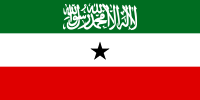Somali National Movement
| Somali National Movement (SNM) | |
|---|---|
| Participant in Somali Civil War | |
 |
|
| Ideology | Anti-communism |
| Groups | Isaaq |
| Leaders |
|
| Headquarters | Dire Dawa, Hargeisa |
| Area of operations |
|
| Became |
|
| Allies | United Somali Congress |
| Opponents | Somali National Army |
The Somali National Movement (Somali: Dhaq dhaqaaqa wadaniga soomaliyeed, Arabic: الحركة الوطنية الصوماليه) was a 1980s–1990s Somali rebel group. The Somali National Movement was organized in London, England, on April 6, 1981 by Hasan Adan Wadadi, a former Somali diplomat, who stated that the group's purpose was to overthrow the Siad Barre regime, The SNM gathered its main base of support from members of the Isaak clan, who joined and supported the movement in response to years of systematic discrimination by the Siad Barre government.The SNM at first did not necessarily support secession, The USC's announcement of a provisional government in February 1991 angered the SNM who maintained that they had not been consulted. Pressure for secession evidently came from the SNM's followers, who were devastated by the loss of lives and the destruction of northern cities by the Siad Barre government. In Hargeisa, for instance, only 5% of the city's buildings remain standing.
In April 1981, a group of Isaaq dissidents living in east London (Whitechapel) formed the Somali National Movement (SNM), and at the end of 1981 it was announced in London, which subsequently became one of the Somalia's various insurgent movements. According to its spokesmen, the rebels wanted to overthrow Siad Barre's dictatorship.
The SPM succeeded in overrunning several government outposts in southern Somalia. The SNM-USC-SPM unification agreement failed to last after Siad Barre fled Mogadishu. On January 26, 1991, the USC formed an interim government, which the SNM refused to recognize. On May 18, 1991, the SNM declared the northwestern Somali regions independent, establishing the Republic of Somaliland. The USC interim government opposed this declaration, arguing instead for a unified Somalia. Apart from these political disagreements, fighting broke out between and within the USC and SPM.
The SNM was extremely influential in the establishment of Somaliland, a self-declared sovereign state that is internationally recognised as an autonomous region of Somalia. Many former SNM members would be key in the formation of the government and constitution.
...
Wikipedia
